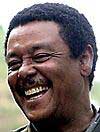|
|
|||||||
|
Regime Change in Haiti: |
|||||||
| Washington - Tuesday, March 2, 2004 - by: Mark Weisbrot | |||||||
|
|
|
||||||
|
kidnapped |
We still don't know the exact circumstances of President Aristide's departure from Haiti last Sunday. Aristide, as well as some members of the U.S. Congress, call it a kidnapping. The Bush Administration denies these charges. | ||||||
|
|
|||||||
|
forced |
But one thing seems clear: he did not voluntarily step down from the presidency. He was forced out, and the United States helped force him out. | ||||||
|
|
|||||||
|
US |
We know from press reports that the United States government was in control of Aristide's security. There were no security problems for American citizens, embassy personnel, or anyone else our government wanted to protect. A handful of Marines were able to secure the airport. But Secretary of State Colin Powell informed Aristide that the United States would not protect him. In other words, you either resign and leave or you may be killed. | ||||||
|
|
|||||||
|
interfered |
Even worse, the Miami Herald reported on Monday that | ||||||
"the Bush administration blocked a last-minute attempt by [Aristide] to bolster his bodyguards." |
|||||||
|
|
|||||||
|
US |
The Bush administration had already called for Aristide to resign. But the Administration has been working on toppling Aristide for the past three years, plunging the country into chaos in the process. | ||||||
|
|
|||||||
|
cut off |
The major international financial institutions (IFI's) -- including the IMF, World Bank and the Inter-American Development Bank, supported the administration's destabilization efforts by cutting off hundreds of millions of dollars in credit to one of the most desperately poor countries in the world. | ||||||
|
|
|||||||
|
starve |
The pretext was a dispute over the election of seven senators of Aristide's party in 2001. Aristide offered every possible solution but it didn't matter. With Washington and the IFI's backing them, the opposition refused any agreement short of Aristide's resignation. This put the IFI's in the role of starving Haiti until its elected president resigned. | ||||||
| This was a terrible crime, for which these institutions should be called to account, and added greatly to the misery and suffering of the Haitian people. | |||||||
|
|
|||||||
|
Clinton |
The latest coup is in many ways a repeat of the military coup that overthrew Aristide in 1991. Although many Americans know that President Clinton sent 20,000 troops to restore Aristide to the presidency in 1994, they do not know about Washington's role prior to that. | ||||||
|
|
|||||||
|
US |
The United States, which occupied Haiti militarily from 1915-1934 and had plenty of support for the murderous Duvaliers who ruled the country from 1956-1986, had a problem when Haiti held the first democratic election in its history. | ||||||
|
|
|||||||
|
CIA |
Aristide, a populist priest who preached liberation theology, was elected by a landslide in 1990. After serving seven months in office, he was overthrown by the military. The officers who led the military coup were, as later reported by the New York Times, on the payroll of the CIA. But the Washington connection did not end there. | ||||||
|
|
|||||||
|
death |
A death squad organization known by the French acronym F.R.A.P.H was formed, and murdered at least 3000 of Aristide's supporters over the next three years. The founder of the organization, Emanuel Constant, stated in an interview on CBS' 60 minutes that he was paid by the CIA to create and maintain the organization during the dictatorship. He now lives in New York. | ||||||
|
|
|||||||
|
murderer |
|
||||||
|
|
|||||||
|
atrocities |
On Monday four men, thought to be supporters of Aristide, were found shot to death with their hands tied behind their backs. The Bush administration seems in no hurry to prevent the kind of atrocities that happened after the last coup. | ||||||
|
|
|
||||||
|
democracy |
Some members of Congress, including Democratic presidential candidate John Kerry, have called for an investigation of what happened to Aristide. But more countries must get involved. When Hugo Chavez of Venezuela was overthrown in April 2002, the Bush team supported the coup and pretended that Chavez had "resigned." But they were forced to reverse themselves after 19 Latin American countries, including Mexico and Brazil, condemned the coup. | ||||||
|
|
|||||||
|
|
Where are these countries now? | ||||||
|
|
Co-Directors |
||||||
|
distributed to newspapers by Knight-Ridder/Tribune Information |
|||||||
| References: | |||||||
| Jackson, Jesse, Bush undermined Haiti democracy (PDF) March 2, 2004, Chicago Sun-Times | |||||||
| BBC News, US rejects Aristide coup claim (PDF) March 2, 2004, BBC | |||||||
| Neighbour, Margaret, Haiti rebel leader names himself military chief (PDF) March 3, 2004, The Scotsman | |||||||
| Montgomery, Sue and Edwards, Steven, Haitians welcome rebel leader (PDF) March 2, 2004, The National Post | |||||||
| Richter, Paul and Farley, Maggie, Aristide: U.S. agents forced me to flee (PDF) March 2, 2004, The Indianapolis Star | |||||||
| The Seattle Times, Key players in Haitian politics (PDF) March 2, 2004, The Seattle Times | |||||||
|
|
|||||||
|
|
|||||||

